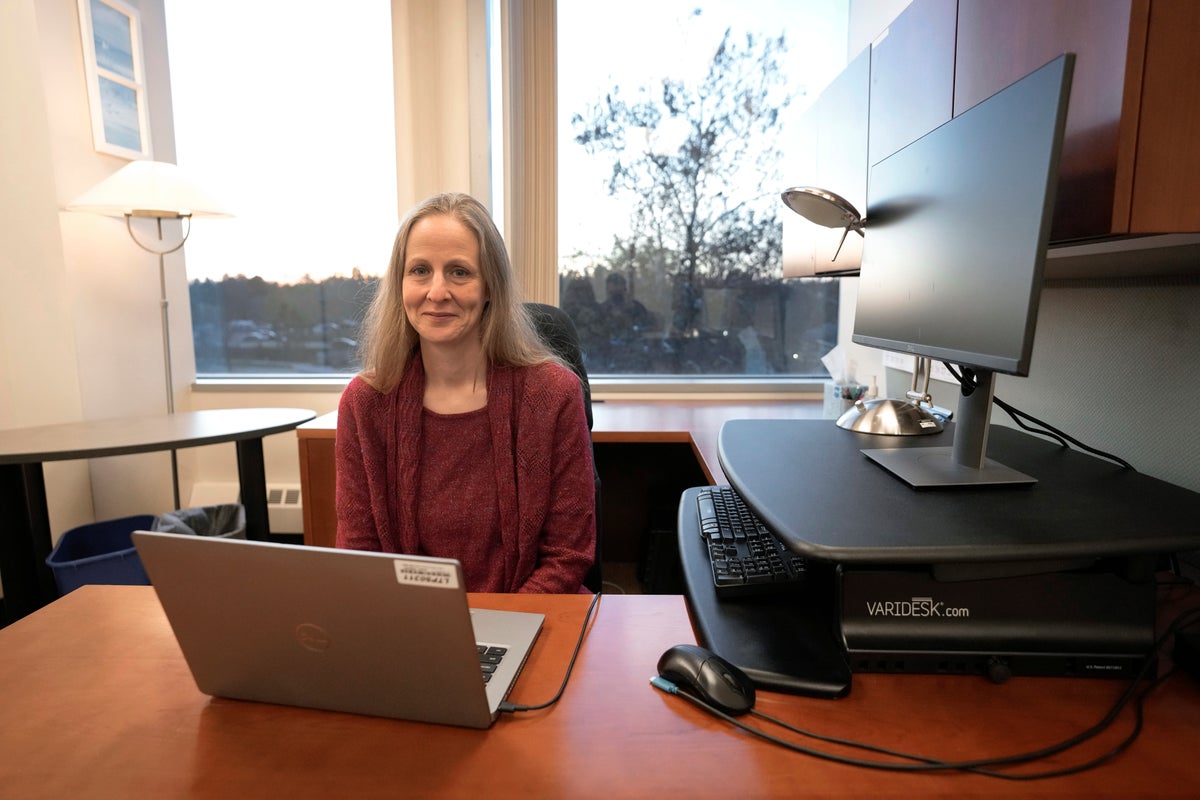
Mental health advocates say there’s a cruel quirk in abortion bans in several states: There are exemptions for life-threatening emergencies, but psychiatric crises don’t count.
It makes no sense to an Arizona mother of three who became suicidal during her fourth pregnancy and says an abortion saved her life. Or to researcher Kara Zivin, who nearly died from a suicide attempt in pregnancy and whose work suggests these crises are not uncommon.
Zivin had a healthy baby, but she sympathizes with women facing mental health emergencies who believe their only option is to end a pregnancy.
“People often try to treat mental health as distinct from physical health, as if your brain is somehow removed from the rest of your body,” said Zivin, a University of Michigan professor of psychiatry, obstetrics and gynecology, and health management.
Abortion crackdowns enacted or enforced since Roe v. Wade was overturned in June illustrate the dichotomy. In at least eight states that allow exemptions for life-threatening conditions, physical health is the focus. The mother’s mental health is not included.
Some of these exemptions are murkily written. Others are explicit. Laws in Georgia, Nebraska and West Virginia specify that medical emergencies don’t include suicide threats. A county judge's ruling overturning Georgia's law on Tuesday is being appealed. Florida’s exemption includes life-threatening illnesses “other than a psychological condition.”
Some abortion foes say the laws are intended to keep women from faking mental illness to get doctors to end their pregnancies.
Patricia, who is 31, married and “your average neighborhood Chicana,” says her agony was painfully real. The Phoenix woman spoke to The Associated Press on condition that only her first name was used, citing safety concerns and privacy.
She says a wave of severe depression hit her the summer of 2018 and broke “not only my mind, but my heart and soul.” She couldn’t eat, sleep or properly care for her three young daughters. Panic and suicidal thoughts bombarded her. When she learned a few weeks later that she was pregnant again, she knew she was in no shape to mother another one.
Her abortion was legal in Arizona at the time. The state recently enacted a near-total ban, though it is temporarily on hold.
Postpartum depression is well-recognized — U.S. studies show it affects about 1 in 8 women — but evidence suggests depression during pregnancy may be even more common.
Mental health conditions including suicide and substance use became the leading underlying cause of pregnancy-related deaths in 2017-2019, ahead of bleeding, heart conditions and infections, the Centers for Disease Control and Prevention said in a September report.
Zivin co-authored a study published last year that found that suicidal thoughts and behavior among commercially insured U.S. individuals before, during and after pregnancy were rising. The rates were low, but they increased among those with anxiety or depression from 1 per 10,000 in 2006 to almost 3 per 10,000 in 2017.
Zivin did not consider ending her pregnancy 10 years ago but said she understands why a woman who becomes suicidal would feel that abortion is her only option. She called the limited exemption laws “unfortunate” and said politicians who wrote them “don’t appreciate or understand the burden of mental illness.”
Observers note that before the 1973 Roe v. Wade decision legalizing abortion, a mental illness diagnosis enabled some women to get abortions and some states required psychiatrists to certify the diagnosis.
Abortion foes contend that many women pre-Roe faked mental illness and that psychiatrists became their accomplices.
The old laws “essentially forced psychiatrists to stretch the truth," said Carole Joffe, a OB-GYN professor at the University of California, San Francisco.
She noted that California once required two psychiatrists to sign off on such abortions.
“It was like everything else having to do with health care and abortion pre-Roe. It was class-based.” she said. "Most of these psychiatrists didn’t do it for free. You had to have the money."
The laws banning mental health exceptions show indifference “to the very real mental illness that some pregnant people have” and shows "how inappropriate it is for politicians to make health care policy," Joffe said.
Rep. Ed Setzler, a Georgia Republican who sponsored that state's law, argued that "a claim of stress or mental anguish just doesn’t rise to the level that the legislature was persuaded that the life of the child should be ended as a result.”
Eric Johnston, president of Alabama Pro Life Coalition, wrote that state’s near-total abortion ban and said a suicide exemption was included at the request of the state medical association. The narrowly drawn measure only exempts suicidal women who are diagnosed by a psychiatrist and requires that the abortion be performed at a hospital.
“If you put it in there and don’t closely define it, it’s a hole big enough to drive a truck through,” he said
The National Right to Life Committee, an anti-abortion group that has lobbied for these measures, defended the restrictions.
“A mother facing serious mental health issues should receive counseling and mental health care. Having an abortion will not mitigate mental health issues,” said spokeswoman Laura Echevarria.
According to the American Psychological Association, there is evidence that being denied an abortion may cause mental distress.
Michelle Oberman, a Santa Clara University law professor and expert in reproductive health ethics, said abortion bans that make no exception for severe mental illness are cruel and misguided.
Even if targeting women attempting to fake mental illness is among reasons behind these measures, the laws will inevitably affect those who are truly suffering, she said.
The mindset behind these laws “doesn’t really think through what it would look like to be facing patients with severe mental illness,’’ Oberman said. “What mental health emergencies look like is sort of jaw-dropping,’’ she said. “They’re real and they’re life-threatening.’’
___
Associated Press writers Kim Chandler in Montgomery, Alabama, and Jeff Amy in Atlanta contributed.
___
Follow AP Medical Writer Lindsey Tanner at @LindseyTanner.







